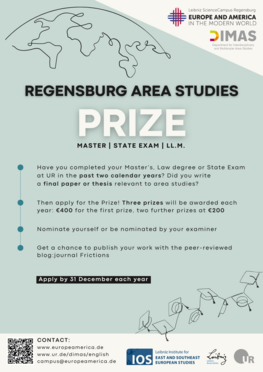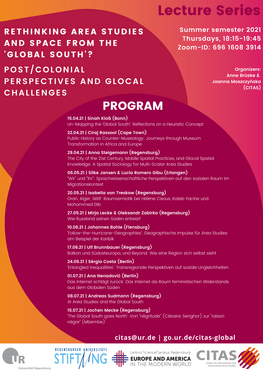Research at the ScienceCampus
At a glance: Research at the ScienceCampus
- Research Trajectories
- (In)Security & Sovereignty
- Translating Knowledge and Cultures
- Uneven Economic Flows
- Refugee Worldmaking
- Augmented Area Studies | AreasLAB
- Early Career Research Networks | Margins of Memory Network
- Regensburg Prize in area studies
- Doctoral Programme
The ScienceCampus is focused on making innovative empirical contributions to knowledge about connections and entanglements of various European regions and the Americas. It also seeks to develop new concepts and approaches for area studies, with a focus on multiscalar area studies. The thematic and theoretical focus of the ScienceCampus emerges from the interdisciplinary research modules and trajectories, outlined below. The aim is to develop academic publications and events, while also translating research into teaching and outreach, both for the public and decision makers in politics, NGOs, business and elsewhere.
The ScienceCampus offers various formats supporting researchers at various stages of their careers, including pre-doctoral and postdoctoral positions, fellowship programmes, and seed money. We envisage up to two calls for seed money each year. It also supports two international Research Networks, led by Regensburg-based early career researchers. Margins of Memory will run from 2025 to 2027, while The Legal Constitution of Borders network will start in 2026.
Research-led Teaching
One outcome of the ScienceCampus' work since launching in 2019 is the online lecture series European-American Entanglements in the Modern World. This course with the Bavarian Virtual University (vhb) can be accessed from around the world. Each talk by either visiting researchers or colleagues in Regensburg is available in German or English, while the teaching materials, which can be incorporated into blended learning, are currently only available in German. More details about the course can be found on this page. The contributions stemmed from the lecture series (Ringvorlesungen) to which the LSC has contributed, from doctoral projects, and from exchanges with visiting researchers.
Natali Stegmann and her students have contributed to the research agenda on institutions, while also applying transregional and multiscalar approaches, in producing teaching materials on the International Labour Organisation (ILO).
The Regensburg Prize in area studies, offered jointly with DIMAS, also demonstrates the commitment of the LSC to furthering excellent research at graduate level. Prize winners are given an opportunity to contribute to the Frictions blog-journal.
Supporting Early Career Researchers
In its first phase, the ScienceCampus funded doctoral researchers and also offered writing up grants. In the second phase, it has created predoctoral and postdoctoral positions designed to provide promising scholars with a post that will enable them to take the first steps at each career stage. Elisa Mucciarelli (predoc) and Elia Bescotti (postdoc) joined the ScienceCampus in April 2025.
The ScienceCampus also supports the internationalization and networking of early career researchers with fundng for attending international conferences and undertaking research. The outgoing fellowship programme is also open to postdoctoral researchers, as well as professors. In the second funding phase, the ScienceCampus supports two international Research Networks, led by Regensburg-based early career researchers. Margins of Memory will run from 2025 to 2027, while The Legal Constitution of Borders network will start in 2026.
The seed money programme also furthers the endeavours of early career researchers. We envisage up to two calls per year.
Interdisciplinary Research Modules & Research Trajectories
The current Research Trajectories form the core of the research programme at the Leibniz ScienceCampus. They are coordinated by scholars from across different disciplines who specialize in different regions in order to encourage fruitful dialogue and exchange, reflecting the centrality of area studies to Europe and America in the Modern World. During the first phase (2019-2025), the Research Modules shaped the agenda of the LSC as collaborative platforms for organising events, including workshops, conferences and public outreach projects. Their activities are outlined below.
The Trajectories offer a foundation for mentoring the ScienceCampus' early career researchers while developing the comparative and/or transregional aspects of their projects as well as bringing together senior researchers in new constellations, including in cooperation with our partners. Members are encouraged to use the Leibniz ScienceCampus Forum on UR GRIPS E-learning platform to exchange ideas, offer support and develop collaboration. They also provide a focal point for visiting researchers to orientate their contributions to the LSC.
The seed money programme and the events programme also furthers the endeavours of the trajectories. Incoming research fellows are expected to make a contribution to furthering the aims and profile of the trajectories.
Research Modules – ScienceCampus First Phase (to August 2025)
- Module 1: Transatlantic political transformations
- Module 2: Cultures and hierarchies of translations
- Module 3: Trade and institutions
- Module 4: Practices of belonging (Verheimatlichung)
- Cross-cutting Module: Towards Multi-Polar and Multi-Scalar Area Studies




